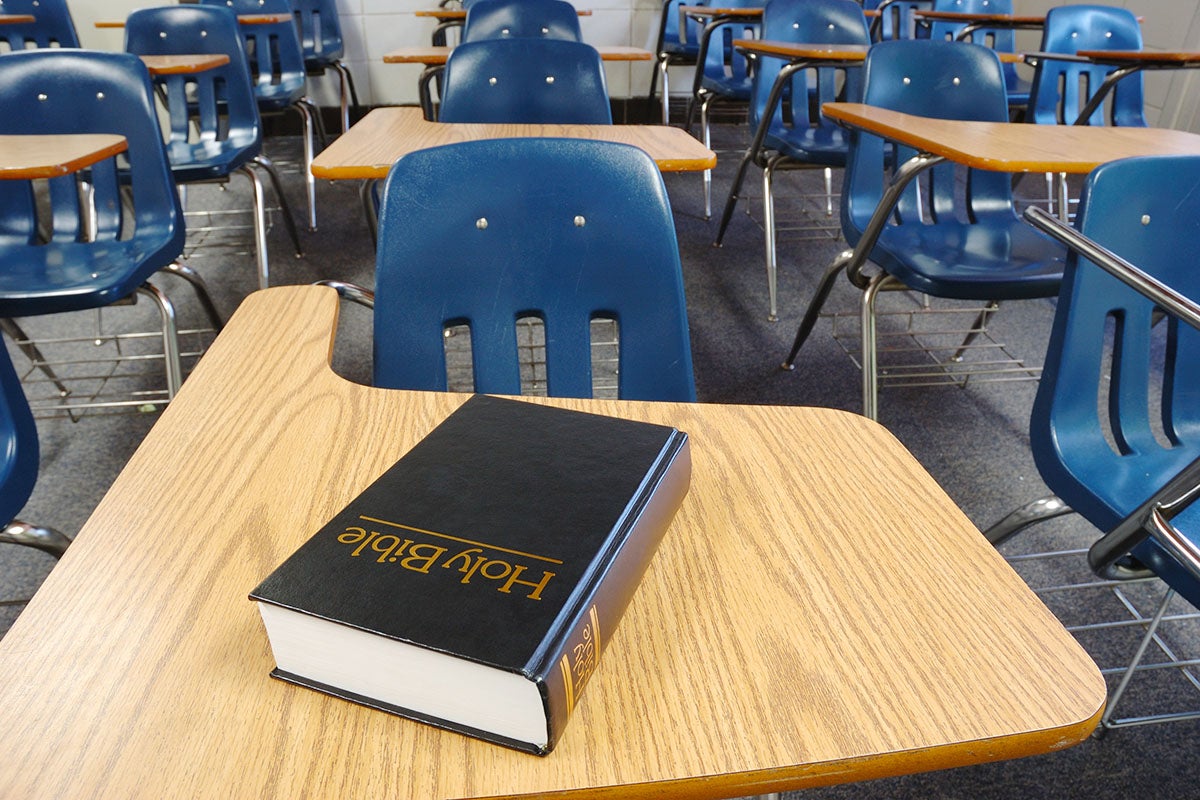At the heart of the upcoming Supreme Court case Carson v. Makin is a complicated question with an even more complex judicial history: In a general funding program for secondary school students, can a state choose not to provide money for those who want to attend religious schools, if its rejection is based on the institution’s inclusion of sectarian teachings?
In the state of Maine, some school districts lack secondary schools. To ensure that all of its students have access to a K-12 education, Maine provides funding for pupils who attend high schools in other districts or at approved private schools. To qualify as an approved school, Maine requires that an institution be “nonsectarian.”
After being denied tuition assistance for their children to attend religious secondary schools, a group of Maine parents sued the state, claiming that its policy violates the Free Exercise Clause in the wake of last year’s decision in Espinoza v. Montana Department of Revenue. In Espinoza, the Court invalidated a Montana rule that prohibited students who received private scholarships — donations to which were tax benefitted — from using them at religious schools.
In the present case, Maine has argued that its policy makes a distinction between religious “status” and religious “use” — and that it would not deny funding to a religious school willing to provide a nonsectarian education. In the lower court, David J. Barron ’94, judge of the United States Court of Appeals for the First Circuit and former Harvard Law School professor, agreed with the state. Espinoza, the court said, only prohibited the denial of funds based on sectarian status, but left open the question of whether funds could be denied for religious use.
In anticipation of oral arguments on December 8, Mark Tushnet, William Nelson Cromwell Professor of Law, Emeritus, at Harvard Law School and constitutional law expert, spoke with Harvard Law Today about Carson v. Makin, what types of questions to expect from the justices, and how the Court’s decision might impact school funding in the future.

Harvard Law Today: What are the central issues in this case?
Mark Tushnet: There are two things going on here. The first is that the Court has developed a rule that says, “if you deny funds that are otherwise generally available to a religiously affiliated institution, because it’s religiously affiliated, that is, because of its status, that’s unconstitutional.” It has also indicated that if you deny funds because the institution is going to use them for religious purposes, that’s constitutionally permissible, or at least it has justified prior decisions denying such funds for religious uses.
The question posed in this case is whether the denial of the funds to the sectarian schools, or the nonsectarian requirement, is based on the status of the schools as sectarian or their use of the funds to teach in a sectarian manner. If it’s status, you can’t deny the funds to them. If it’s use, you might be able to deny the funds.
HLT: It seems obvious what the students and parents want in this case — funding to go to a religious school. What is the state of Maine’s argument? What is its interest?
Tushnet: Maine can maintain public schools that are completely nonsectarian. It has no obligation to fund sectarian education at all — its public elementary schools are completely nonsectarian, and nobody thinks that is a problem. So, if you can have a completely nonsectarian program for elementary school children, Maine says — and I think, clearly correctly — you can have completely nonsectarian programs for high schools. And that’s what they’re trying to accomplish: to have the same kind of nonsectarian education for high school students that they provide to elementary school students.
The Court has become increasingly concerned about discrimination against sectarian interests; this has come out in the Masterpiece Cakeshop and Espinoza decisions.
Mark Tushnet
HLT: What if a religious school argues that it can separate its religious instruction from its other instruction? Would that impact the case?
Tushnet: It could make a difference. If the schools say “our curriculum involves standard courses in English, French, geography, math, that have no sectarian components,” and then say that other courses like ethics, philosophy, whatever, do have a sectarian component, then they would be in a better position to contend that they are being denied funds because of their status. I’m sure there will be questions during oral argument along the lines of: “How do you teach math in a sectarian way?”
That said, I’m not sure that the schools want to make the distinction that I’ve just described. That is, many religiously affiliated schools do want to say that their religious commitments pervade the curriculum. They might not want to say, “we do some stuff that is sectarian and some stuff that is not sectarian.”
HLT: There are two parts to the First Amendment’s religious guarantees: the Free Exercise Clause and the Establishment Clause. Does whether you consider this case a free exercise or establishment question depend on whether you are the state of Maine or the parents?
Tushnet: In some sense, yes. Maine’s position is that its interest in ensuring nonsectarian education for all children is associated with the values of the non-establishment clause. That is, just to take one obvious example: one reason the non-establishment principle exists is to avoid controversies about what kind of sectarian education you would provide in a public school. So, Maine’s commitment to nonsectarian education is associated with the non-establishment principle. I put it that way because it’s not clear that it’s required by the non-establishment principles. Fifty years ago, the answer would have been yes, of course it is. But right now it’s just not clear that public schools can’t have some sectarian components to them. Either way, Maine says, “as a matter of choice, we want our schools to be nonsectarian. And the reason for that choice is that if we allowed them to be sectarian, there will be all sorts of political divisiveness around which religious schools get funded or not.”
From the schools’ and parents’ point of view, this is clearly a Free Exercise question. The parents say, “you’re giving money for us to go to private schools, and we want to go to a sectarian private school. That is an exercise of our religious belief, and you’re interfering with that.”
HLT: How is the Court going to think about the issues in this case?
Tushnet: Two things to keep in mind. First is that there has been a strong trend over the past four decades of the Court increasingly being willing to allow states to channel money to sectarian institutions. And then over the past decade and a half, the Court saying “if you channel money to nonsectarian institutions, you have to channel it to sectarian ones.” This case is just the next step in that line of decisions. Again, if you have a general program direct funds to private schools, you have to allow that money to be directed to sectarian schools. And the Court has become increasingly concerned about discrimination against sectarian interests; this has come out in the Masterpiece Cakeshop and Espinoza decisions.
Now, the doctrinal formulation is going to be whether the funds are denied because of mere status of the schools as sectarian, or whether they’re denied because the state believes that the money is going to be used for sectarian purposes. The formal test will be status versus use. But the background is this concern about discrimination against religious institutions.
What is looming is an argument that the supporters of religiously affiliated education have been making for a long time, but now have much more doctrinal support for.
Mark Tushnet
HLT: Some people have speculated that the Court will decide narrowly on the facts of this case, instead of issuing a new, broad rule. What do you think?
Tushnet: This kind of prediction is always hazardous, but my guess is that they will say that this is a status-based exclusion and therefore impermissible, and will explain why it’s status-based by saying that there is insufficient evidence that the state excluded the schools because they knew they were engaging in sectarian education across the board.
Now, that looks like it would be narrow. The state excluded these people, they defended the exclusion by saying they were concerned about the use, but the Court will say “but you really didn’t have very much evidence about what the use was going to be.” Judge Barron’s opinion basically quotes one paragraph from the commissioner of education explaining why the rejection was use-based. And if you wanted to, you could read it as supporting the state’s case, but if you didn’t, you could say, “Well, that’s not really adequate.”
So the decision will look narrow, but in fact, in many situations, you won’t be able to come up with much about the actual use of the money. A question from the skeptics of this kind of program is, “do you really think that math is taught in a sectarian way? What is the Baptist way of teaching Introduction to Calculus?” And that’s a fair question. By saying the case was missing evidence of use, the implications are pretty broad, even if the decision itself is narrow.
HLT: What would a decision like that mean for funding for religious schools going forward?
Tushnet: Maine’s program is unusual. In Espinoza, there was a voucher system, which is pretty common. The Maine program, by contrast, has this ‘we just don’t have enough public high schools’ component to it. And I don’t think there are many states in a similar position.
However, what is looming is an argument that the supporters of religiously affiliated education have been making for a long time, but now have much more doctrinal support for. The argument is, “you’re taxing everybody to pay for public schools that are nonsectarian. We want to send our kids to sectarian schools. And you’re not giving us that money. You’re making it harder for us to send our kids to religiously affiliated schools.” Each time the Court disallows the exclusion of sectarian programs from something, there is more and more doctrinal support for the argument that if you run public schools in a nonsectarian way, you have to provide something similar at the same cost for parents who want to send their kids to religiously affiliated schools.
